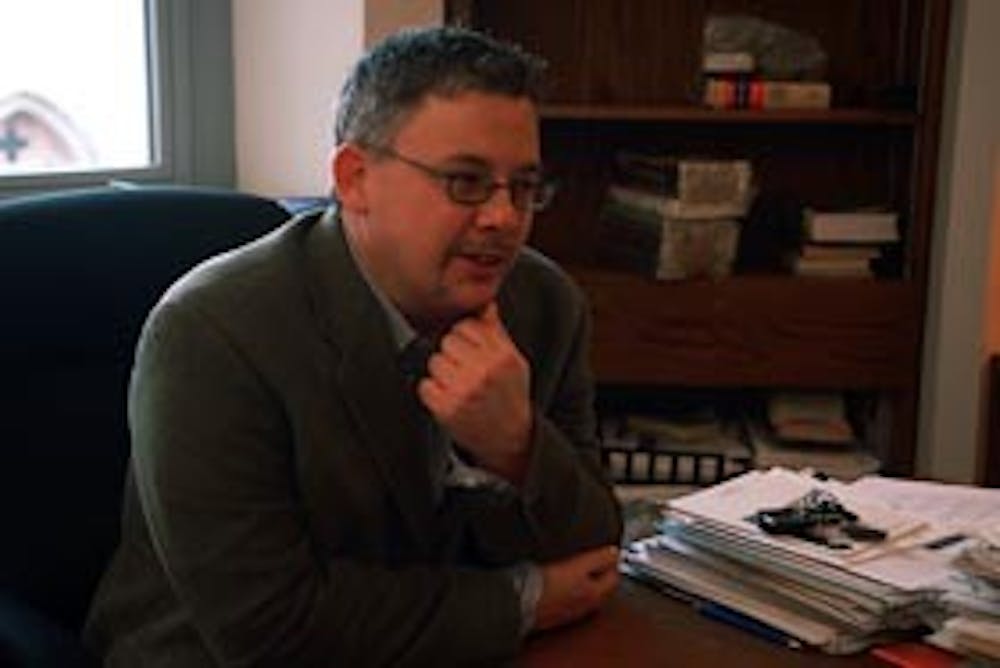
In an office not fully unpacked, a picture of the 10 avatars of Vishnu lines the wall. The different incarnations of the Hindu god look down on Daud Ali, the newest addition to the South Asia Studies Department.
After spending 15 years at the School of Oriental and African Studies in London, Ali has returned to the United States, where he is learning the ropes of American academia.
“I’m getting reacquainted with undergraduate life in America,” said Ali, who attended the College of William and Mary and received his doctorate in history from the University of Chicago.
He noted the differences between academic life in London and in the United States. For instance, no one buys course books in London.
“First, it was outrageous,” Ali said. “It was difficult to teach.”
He has transported a bit of London with him, as he required Penn students to buy only one book for his class last semester, while the rest of the sources could be found on Blackboard or in the library, according to sixth-year Ph.D. student Walt Hakala.
Born in Calcutta to a Bengali father and American mother, Ali’s family moved to America when he was two, settling in Baltimore. He first became interested in studying South Asia when he took a class in Indian philosophy in college.
This ultimately led him to Divinity School at the University of Chicago, where he studied Sanskrit, Tamil and Indian philosophy until he ultimately switched to history.
Ali changed academic paths because although he is interested in the “reasons that people have religious faith,” he found that the Divinity School held onto the notion that man is fundamentally religious. As a non-religious person, he found this to be a “fundamental obstacle.”
And Ali is quite passionate about history, “the best of all humanities departments because it is wide and methodologically open.”
This semester, he is teaching a survey course on Indian history until 1200. He is also teaching Body, Power and Society in Early India, a class his colleagues urged him to title The Kama Sutra.
His students from last semester said his passion for history translates to the classroom. Michael Collins, a first year Ph.D. student in South Asia Studies, remarked that Ali is unique in his “accessibility to students and intellectual curiosity.”
He discusses ideas not in his area of expertise — “a lot of people are not willing to go that extra distance,” Collins explained.
Hakala also commented on Ali’s approachability. “You can call him by his first name,” Hakala said. “He is not at all conceited about his time or work.”
He added that the breadth of Ali’s knowledge is unusual.
In contrast to the larger European studies departments, which allow for more specialization, Ali “teaches 1500 years of history in many different languages on a region the size of Europe,” Hakala said.
The South Asian Studies Department contains only four faculty members, among whom Ali is the only associate professor.
And though Ali’s expertise focuses mainly on the fifth-to-15th centuries, he still oversees dissertations on the 20th century, he added.
Ali hopes to spread this intellectual curiosity to his students. “When I see their minds open up to new perspectives and interpretations, I feel very satisfied,” he said.
Still, Ali said the academic atmosphere today is different than when he was an undergraduate. “Now there is a lot more pressure on students to become adults,” he explained. “I didn’t know what a C.V. was until my final year of graduate school.”
This translates to the classroom, where students exhibit less “openness to engage in learning that isn’t directly relatable to a life plan or career,” he explained.
Nevertheless, Ali has great passion for South Asia Studies. He believes that not only does it “behoove students who want to understand America’s entanglements in South Asia,” but also that South Asia contains “intrinsic interest” for those who want to understand the history of their own societies.
In Ali’s 15-person class last semester, “five or six advanced Ph.D.s were sitting in just to learn, for no credit,” fifth-year Religious Studies Ph.D. candidate Leah Comeau said.
“We just wanted to hear what he’s about because that’s how good he is.”
The Daily Pennsylvanian is an independent, student-run newspaper. Please consider making a donation to support the coverage that shapes the University. Your generosity ensures a future of strong journalism at Penn.
DonatePlease note All comments are eligible for publication in The Daily Pennsylvanian.








